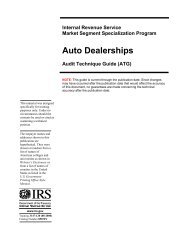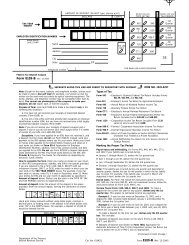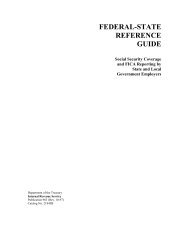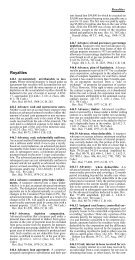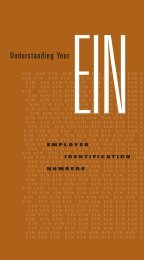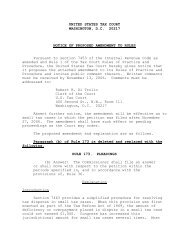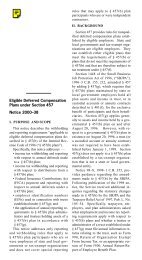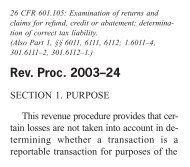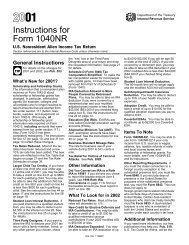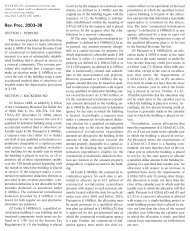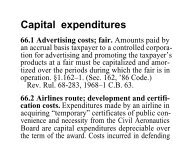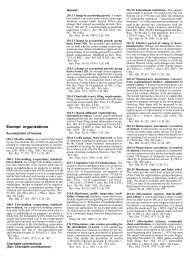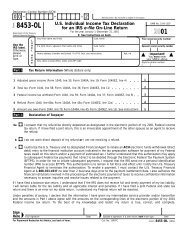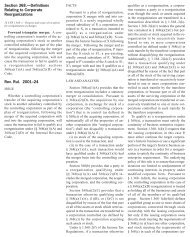Exemptions (Personal and dependency) - Uncle Fed's Tax*Board
Exemptions (Personal and dependency) - Uncle Fed's Tax*Board
Exemptions (Personal and dependency) - Uncle Fed's Tax*Board
Create successful ePaper yourself
Turn your PDF publications into a flip-book with our unique Google optimized e-Paper software.
none of the prior years’ support. Held, the payments<br />
in 1962 could not be reduced by the amount<br />
of arrerages; the taxpayer was entitled to claim<br />
the exemptions. (Sec. 152, ’86 Code.)<br />
Frank P. Gajda, 44 T.C. 783, Acq., 1966-1 C.B.<br />
2.<br />
222.13 Children of divorced parents; payments<br />
in arrears. Payments made by a divorced<br />
husb<strong>and</strong>, who fails to pay “child support” for a<br />
calendar year, but pays the arrearage in a subsequent<br />
year, is not child support furnished either for<br />
the year such payments were in arrears or the year<br />
the arrearage was paid, but is reimbursement to the<br />
divorced wife for child support furnished by her<br />
during the period such payments were in arrears.<br />
§39.25-2. (Sec. 25, ’39 Code; Sec. 151, ’86 Code.)<br />
Rev. Rul. 220, 1953-2 C.B. 22.<br />
222.14 Children of divorced parents; support.<br />
A divorced husb<strong>and</strong> who contributes over<br />
$1200 toward his child’s support is entitled to a<br />
<strong>dependency</strong> exemption where the custodial wife<br />
<strong>and</strong> her mother together provided over half the<br />
support <strong>and</strong> no multiple support agreement was<br />
filed. (Sec. 152, ’86 Code.)<br />
Rev. Rul. 71-22, 1971-1 C.B. 43.<br />
222.15 Children of divorced parents; support;<br />
agreement. A written child <strong>dependency</strong><br />
agreement between divorced parents executed<br />
after the taxable year in which child support payments<br />
were made by the noncustodial parent but<br />
within the statutory period for filing a claim for<br />
refund meets the requirements of section<br />
152(e)(2)(A)(i). (Sec. 152, ’86 Code.)<br />
Rev. Rul. 70-73, 1970-1 C.B. 29.<br />
222.16 Children of divorced parents; support;<br />
lodging. Two minor children lived with their<br />
mother in a house jointly owned by the parents,<br />
who were separated <strong>and</strong> later divorced without<br />
making provision for disposition or use of the<br />
jointly-owned house. Held, in determining which<br />
parent furnished over half the support of the two<br />
children, the item of lodging is considered furnished<br />
half by each parent. (Sec. 152, ’86 Code.)<br />
Eva L. Lindberg, 46 T.C. 243, Acq., 1967-2<br />
C.B. 2.<br />
222.17 Children of divorced parents; support<br />
payments deposited in account; medical<br />
expenses. A divorced taxpayer, not having custody<br />
of the children of a former marriage but<br />
entitled to claim the children as dependents, may<br />
deduct the medical expenses of the children paid<br />
by the taxpayer’s former spouse from a special<br />
account established for the support money provided<br />
by the taxpayer for the children. §§1.152-4,<br />
1.213-1. (Secs. 152, 213; ’86 Code.)<br />
Rev. Rul. 76-344, 1976-2 C.B. 82.<br />
222.18 Children of divorced parents; support<br />
payments deposited in educational fund. A noncustodial,<br />
divorced parent making child support<br />
payments of $1,200 constituting more than onehalf<br />
the child’s support is entitled to the <strong>dependency</strong><br />
exemption, even though the payments are<br />
deposited in a special educational fund by the parent<br />
having custody. I.T. 3883 superseded. (Secs.<br />
151, 152; ’86 Code.)<br />
Rev. Rul. 71-43, 1971-1 C.B. 44.<br />
222.19 Children of divorced parents; support<br />
provided by custodial parent <strong>and</strong> new spouse.<br />
A remarried custodial parent may include the support<br />
provided by the new spouse to determine<br />
which of the divorced parents is entitled to the<br />
<strong>dependency</strong> exemption for their child. Rev. Rul.<br />
71-19 revoked; amplified by Rev. Rul. 78-91.<br />
§§1.151-2, 1.152-4, 301.780-1. (Secs. 151, 152,<br />
7805; ’86 Code.)<br />
Rev. Rul. 73-175, 1973-1 C.B. 58.<br />
222.20 Children of divorced parents; support<br />
provided by custodial parent’s new spouse.<br />
Support provided for the children of divorced parents<br />
by the custodial parent’s new spouse will be<br />
attributed to the custodial parent in determining<br />
whether the divorced parents contributed over half<br />
the children’s support during the calendar year. If<br />
the divorced parents together provided over half<br />
the support, the noncustodial parent will be<br />
entitled to the <strong>dependency</strong> exemptions if a decree<br />
of divorce or written agreement so provides <strong>and</strong><br />
the noncustodial parent contributed at least $600<br />
for the support of each child for the year. Rev. Rul.<br />
73–175 amplified. §§1.151-2, 1.152-4. (Secs.<br />
151, 152; ’86 Code.)<br />
Rev. Rul. 78-91, 1978-1 C.B. 36.<br />
222.21 Dual status Canadian citizen; nondiscrimination<br />
clause. The nondiscrimination<br />
clause of Paragraph 11 of the Protocol to the U.S.-<br />
Canada Income Tax Convention, as amended, providing<br />
in effect, that citizens of Canada residing in<br />
the U.S. may not be subjected t omore burdensome<br />
taxes than U.S. citizens, does not prevent the U.S.<br />
from denying a Canadian citizen who is both a resident<br />
<strong>and</strong> nonresident of the U.S. during the taxable<br />
year the benefits of using the head of household<br />
tax rate schedules, optional tax tables,<br />
st<strong>and</strong>ard deduction, or joint return. §§1.1-1,<br />
1.2-2, 1.4-1, 1.142-2, 1.6013-1. (Secs. 1, 2, 4,<br />
142, 6013; ’86 Code.)<br />
Rev. Rul. 74-239, 1974-1 C.B. 372.<br />
222.22 Exchange students. German students<br />
brought to the U.S. under the International Educational<br />
Exchange Service <strong>and</strong> placed in American<br />
homes for a temporary period of one year are not<br />
residents of the U.S. <strong>and</strong> may not be included in<br />
the term dependent. (Sec. 152, ’86 Code.)<br />
Rev. Rul. 55-653, 1955-2 C.B. 38.<br />
222.23 Foster parent. A <strong>dependency</strong> exemption<br />
may be taken by a taxpayer for his foster parent<br />
who owns the house in which he <strong>and</strong> the taxpayer<br />
live if the statutory requirements are met.<br />
§§1.151-1, 1.152-1. (Secs. 151, 152; ’86 Code.)<br />
Rev. Rul. 64-41, 1964-1 (Part 1) C.B. 84.<br />
222.24 Foster parents. Factual situations illustrate<br />
the tax treatment of amounts received <strong>and</strong><br />
amounts expended by individuals providing foster<br />
care to children. I.T. 4068 superseded. §§1.61–1,<br />
1.62-1, 1.151-2, 1.162-1, 1.170-2, 1.1401-1,<br />
1.6041-1. (Secs. 61, 62, 151, 162, 170, 280A,<br />
1401, 3121, 3306, 3401, 6041; ’86 Code.)<br />
Rev. Rul. 77-280, 1977-2 C.B. 14.<br />
222.25 H<strong>and</strong>icapped children; state institutions.<br />
Amounts expended by a state for room,<br />
board, <strong>and</strong> tuition for h<strong>and</strong>icapped children while<br />
attending specialized state schools for the h<strong>and</strong>icapped<br />
is a scholarship <strong>and</strong> should not be taken<br />
into account in determining a <strong>dependency</strong> exemption.<br />
Clarified by Rev. Rul. 60-190; distinguished<br />
by Rev. Rul. 71-491. §§1.117-1, 1.151-2,<br />
1.152-1. (Secs. 117, 151, 152; ’86 Code.)<br />
Rev. Rul. 59-379, 1959-2 C.B. 51.<br />
222.26 Head of household; dependent foster<br />
child. A dependent foster child will qualify a taxpayer<br />
for head of household status under section<br />
2(b)(1)(A)(ii). However, if the foster child is not<br />
a dependent of the taxpayer, the taxpayer will not<br />
qualify for head of household status under section<br />
2(b)(1)(A)(i). §§1.1–1, 1.2–2, 1.152–1. (Secs. 1,<br />
2, 152; ’86 Code.)<br />
Rev. Rul. 84-89, 1984-1 C.B. 5.<br />
222.27 Head of household; dependent in<br />
mental institution. A taxpayer who maintained a<br />
home for <strong>and</strong> was the sole support of his sister<br />
before she was confined in a mental institution<br />
qualified as a head of household, even though his<br />
sister did not actually reside with him during the<br />
taxable year. (Sec. 12(c), ’39 Code; Sec. 1, ’86<br />
Code.)<br />
Walter J. Hein, 28 T.C. 826, Acq., 1958-2 C.B.<br />
6 .<br />
<strong>Exemptions</strong> (<strong>Personal</strong> <strong>and</strong> <strong>dependency</strong>)<br />
222.28 Head of household; gr<strong>and</strong>child;<br />
dependent of another. A widow who maintained<br />
a household which constituted the principal place<br />
of abode of a gr<strong>and</strong>daughter from the date of birth<br />
until the end of the taxable year qualifies as the<br />
head of a household irrespective of the fact that the<br />
gr<strong>and</strong>daughter was claimed as a dependent by<br />
another taxpayer. §39.12-4. (Sec. 12, ’39 Code;<br />
Secs. 1, 2, ’86 Code.)<br />
Rev. Rul. 55–329, 1955–1 C.B. 205.<br />
222.29 Head of household; nonresident alien<br />
spouse. A “head of household” status may not be<br />
obtained by a taxpayer by virtue of his nonresident<br />
alien wife. However, a taxpayer having a nonresident<br />
alien wife may qualify as “head of a household”<br />
if he can obtain such status by virtue of a<br />
dependent, an unmarried descendant, or unmarried<br />
stepchild. Amplified by Rev. Rul. 74-370.<br />
(Sec. 1, ’86 Code.)<br />
Rev. Rul. 55–711, 1955–2 C.B. 13.<br />
222.30 Head of household; nonresident alien<br />
spouse. A U.S. citizen or resident alien married to<br />
<strong>and</strong> living with a nonresident alien <strong>and</strong> maintaining<br />
in his household a dependent child is considered<br />
married for st<strong>and</strong>ard deduction purposes <strong>and</strong><br />
may not use the optional tax table for head of<br />
household provided by section 3; he may use the<br />
head of household tax rate schedule provided by<br />
section 1(b), but is limited to one-half the maximum<br />
percentage st<strong>and</strong>ard deduction. If the nonresident<br />
alien spouse is not a member of the household<br />
during the year, <strong>and</strong> the other requirements of<br />
section 143(b) are met, he could elect to use the<br />
optional tax table for head of household. Rev. Rul.<br />
55-711 amplified. §§1.2-2, 1.3-1, 1.141-1,<br />
1.143-1. (Secs. 2, 3, 141, 143; ’86 Code.)<br />
Rev. Rul. 74-370, 1974-2 C.B. 7.<br />
222.31 Head of household; nonresident alien<br />
spouse. A U.S. citizen or resident alien who was<br />
married to <strong>and</strong> living with a nonresident alien <strong>and</strong><br />
their dependent child in 1977 may use the head of<br />
household tax table or tax rate schedule <strong>and</strong> is<br />
entitled to the zero bracket amount for heads of<br />
household in computing taxable income for 1977.<br />
For purposes of computing the general tax credit,<br />
the taxpayer is not subject to the limitations of section<br />
42(c). §§1.2–2, 1.143–1. (Secs. 1, 2, 3, 42, 63,<br />
143; ’86 Code.)<br />
Rev. Rul. 79-23, 1979-1 C.B. 3.<br />
222.32 Head of household; parent maintained<br />
in rest home or home for aged. A taxpayer<br />
who pays the entire expense of maintaining<br />
his elderly father in a rest home or a home for the<br />
aged may compute his Federal income tax using<br />
head of household rates. Rev. Rul. 57-307<br />
revoked. §1.1–2. (Sec. 1, ’86 Code.)<br />
Rev. Rul. 70-279, 1970–1 C.B. 1; John Robinson,<br />
51 T.C. 520, Acq., 1970–1 C.B. xvi.<br />
222.33 Head of household; principal place of<br />
abode. The Service will not follow the decision in<br />
Clair Smith attributing the head of household status<br />
to a taxpayer maintaining a household that was<br />
the principal place of abode of her adopted son but<br />
was not also her principal place of abode. §1.2–2.<br />
(Sec. 2, ’86 Code.)<br />
Rev. Rul. 72-43, 1972-1 C.B. 4.<br />
222.34 Head of household; right to exercise<br />
family control. A taxpayer, who contributes more<br />
than half of the cost of maintaining a household<br />
where he <strong>and</strong> his qualifying dependents live as<br />
members of such household, <strong>and</strong> who otherwise<br />
meets the requirements of section 1(b)(2), may<br />
compute his tax as the head of a household. The<br />
right to exercise family control is not a deciding<br />
factor in determining a taxpayer’s status as head of<br />
a household. §1.1–2. (Sec. 1, ’86 Code.)<br />
Rev. Rul. 57-415, 1957-2 C.B. 13.<br />
222.35 Head of household; support of parents;<br />
exclusion of fair rental value of home. Taxpayer<br />
furnished over half the funds expended in



